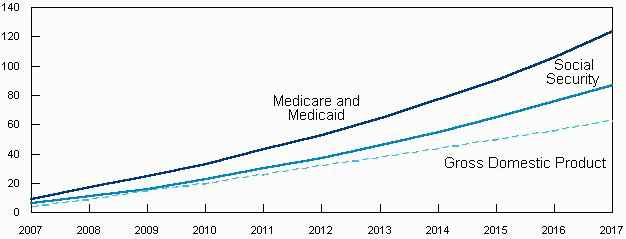The 10 Year Budget Outlook
The Congressional Budget Office has provided a 10 year benchmark for tax revenues, outlays, and deficits/surpluses. Below are some of the numbers from the table,
| Actual 2006 | 2007 | 2008 | 2009 | 2010 | 2011 | 2012 | 2013 | 2014 | 2015 | 2016 | 2017 | |
| Total Revenues | 2,407 | 2,542 | 2,720 | 2,809 | 2,901 | 3,167 | 3,404 | 3,550 | 3,717 | 3,896 | 4,084 | 4,284 |
| Total Outlays | 2,654 | 2,714 | 2,818 | 2,926 | 3,038 | 3,179 | 3,234 | 3,391 | 3,533 | 3,687 | 3,892 | 4,034 |
| Total Deficit or Surplus | -248 | -172 | -98 | -116 | -137 | -12 | 170 | 159 | 185 | 208 | 192 | 249 |
| On-budget | -434 | -357 | -299 | -332 | -367 | -258 | -85 | -101 | -79 | -57 | -72 | -10 |
| Off-budget | 186 | 185 | 201 | 216 | 230 | 246 | 255 | 261 | 264 | 265 | 264 | 259 |
| Source: Congressional Budget Office | ||||||||||||
Around 2011 things start to look pretty good. The deficit is projected to be only $12 billion dollars and after that there is a surplus. But there is some bad news there. The reasons that things get better is that what are broadly described as the Bush tax cuts (the conomic Growth and Tax Relief Reconciliation Act of 2001 and Jobs and Growth Tax Relief Reconciliation Act of 2003) expire on Dec. 31 of 2010. Also, the Alternative Minimum Tax will take a bigger and bigger bite out of tax payers. Changing either of these two things will change the above chart to increase the deficit and push back the years in which the budget will reach surplus. Extending the Bush tax cuts could reduce revenues by $3 trillion dollars over the 10 year period according the CBO. That number might be reduced somewhat if dynamic scoring is used, but it wouldn’t be a significant reduction.
A bit of good news is that the CBO is forecasting improved economic growth in 2008. The forecast for 2007 is 2.3% (which, by historical standards is fairly low), but with a bit of a rebound in 2008 to 3.0%. But this good news should be taken in the context of some serious fiscal problems facing the country, namely Medicare, and to a lesser extent Social Security. The following graph makes clear the problem,
Projected Growth of the U.S. Economy and Federal Spending for Major Mandatory Programs
(Cumulative nominal percentage growth from 2006 level)

Yes, Medicare spending is projected to double by the end of 2017. Notice that the growth rate of GDP is lower than that of Medicare. If these growth rates hold, then it is merely a matter of time before Medicare’s budget is greater than the whole of America’s GDP. If the CBO’s estimate for the growth rate of Medicare is correct every 10 years Medicare’s budget will double, so in 2017 it will be 2x today’s budget. In 2027 it will be 4x and by 2037 it will be 8x. If nothing is done to stop this kind of growth it will stop itself. Most likely by having the U.S. economy collapse under such a strain.
So, while the short term looks good, the long term outlook is not so great. No economic growth cannot save us unless growth takes a sudden and permanent shift upwards–i.e. growth doubles from now to eternity–and hoping for this strikes me as a really bad policy.





So lets see if I follow all this.
So long as we dont extend the Bush tax cuts, we will be fine.
Since we were fiscally fine before the Bush tax cuts (first surpluses in 30 some years), I guess we can conclude that the Bush tax cuts were a pretty dumb idea – just adding a huge dollop of debt that we will eventually pay off, but could have done so a lot sooner. Ah, the price we pay for listening to the GOP “keep your own money (and screw your children)” line.
But then you seem to contradict the good news with the vision of the ever-exponentially-increasing entitlements. As an aside, I wonder why, if you embrace such forecasts here, you are so averse to ever-exponentially-increasing global temperatures. At least there seems to be a causal driver for the temperatures – the unarguable fact that CO2 is being relentlessly pumped into the atmosphere, with no end in sight. There is, however, and end, or at least a lessening of entitlement drivers, isnt there? We all know about the retirement of the baby boomers as the problematical driver, but wont that bubble play out at some point? What happens when all, or most of the boomers are gone?
In other words, I would like to see these doomsday scenarios take account of the end of the boomer bubble as well as its beginnings and zenith. I’m not making any assertions about what I think will happen then, but the projections would seem more credible if they dealt with that more explicitly.
People need to face facts, we are toast. This administration has dug us in so deep, it will be a generation before we see the light of day again. Thanks so much!
P.S. Maybe this is the plan. I mean Norquist and Co. have been saying for years that the only way to reduce spending, entitlements that is, is to belly up the system. Looks like another “mission accomplished” to me. Once more for the troops…Thanks so much!
And none of this really takes into consideration the “debt” or the trade deficit or the fact that we will be living with ever increasing costs for energy.
I haven’t seen any evidence that the increasing temeperatures will crush the U.S. economy in about 30 or so years. I haven’t seen any evidence that any plan put forward so far will do anything other than help begger the U.S. and other countries.
By the way, google Peter Orszag the guy who gave the testimony and who is head of the CBO. Not exactly your screaming crazy conservative. He was affiliated with Brookings, Brad DeLong–the arch conservative–likes him…in short, Tano, you are demonstrating your ignorance on a colossal scale…again.
Tano you are as ignorant as you are arrogant. In a word, no. The reason nobody expects that “bubble” to pass is due to increasing life expectancies. In short, that bubble will be permanant. Of course, a collapse of the U.S. economy might work wonders for life expectancy with all those old people simply dying instead of getting health care.
And yet more ignorance from the arrogant one. Tano, that Medicare and health care spending are on unsustainable paths is not in doubt. Economists who are Democrats/liberals/Lefties, and economists who are Republican/conservative/Righties, and economists who are libertarians/in the middle/whatever all seem to be on the same page. Current growth is unsustainable. Ask Brad DeLong, James Hamilton, Laurence Kotlikoff, and so forth and all will likely agree growth is unsustainable. The arguments are basically on “what to do about this growth”.
MrGone is probably right. Due to partisanship not much will likely be done and things will look pretty bad in 30 or so years. That pre-tax 401k you have been working on? Going to get very hard. So hard you should consider switching to a Roth IRA or some other device that uses after tax dollars, although there is no guarantee the government wont go after that money as well.
MrGone is wrong in that this problem has been around since the early 1980s. Reagan didn’t fix it, he just pushed it off into the future. Bush I didn’t fix it since Reagan’s “fix” kept the problem well into the future. Same thing Clinton. Basically, it is what happens to a pyramid scheme when there are no longer enough people to recruit into the scheme to pay those higher up.
While I have no problems with what you say, this is still a deliberately misleading chart. It is designed to give to give the impression that SS and Medicare & Medicaid are much larger then the entire economy.
Verdon,
You seem to have some sort of a massive insecurity problem, such that you need to preface every response to a challange with some string of juvenile insults.
Get over it already boy. You are playing with grownups now. And if you have this desparate need for stroking, then understand that I would not be asking questions of you, or wasting my time challenging your assertions if I didnt think you capable of intellegent response.
So cut the childish crap already and focus on answering the questions.
And if you did so, you could probably come up with a better response than what you have. I made no assertions about what would happen when the boomers die off – I asked a question. And your response, that the boomer bubble is permanent makes little sense. Nor does you attempt to appeal to authority – liberal authorties no less, satisfactorally answer the questions about the real extent of long term problems.
The notion of SS as a “pyramid scheme” is absurd. There is no inherint reason why a society could not have a stable system of income transfer from the working generations to the retirees. With increasing population, the chances of having a sustainable system only increases. Having a boomer-like bubble is problematical but is inherintly only temporary. Longer life spans could also be problematical but are easily compensated for by tweaking tax rates, retirement ages, benefit levels or some combination of those.
In short, the pyramid scheme charge is groundless.